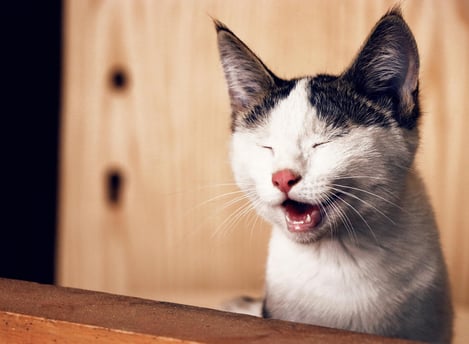Blood in Cat Stool: Causes, Treatment, and When to Worry (A Veterinary Guide)
When pet owners find blood in their cat's poop, it can be scary. This sign could mean several different health issues, from minor to serious. Knowing what it means and when to take your cat to the vet will help you make smart decisions about his or her health.
PET HEALTH
John Harwood
11/24/20243 min read


Finding blood in your cat's stool can be an alarming discovery that sends any pet parent into a state of concern. While this symptom can indicate various health issues ranging from mild to serious, understanding its causes and knowing when to seek veterinary care can help you make informed decisions about your cat's health.
Understanding the Types of Blood in Cat Stools
Bright red blood in your cat's stool (hematochezia) typically indicates bleeding in the lower digestive tract or colon. Dark, tarry stools (melena), on the other hand, suggest bleeding in the upper digestive tract, which often signals more serious conditions requiring immediate veterinary attention.
Common Causes of Bloody Stools in Cats
Dietary issues and food sensitivity can trigger inflammation in your cat's digestive system, leading to bloody stools. Sudden changes in diet or consuming inappropriate foods often manifest in digestive distress, making gradual food transitions essential for your cat's digestive health.
Parasitic infections represent another frequent cause of bloody stools in cats. Roundworms, hookworms, and other intestinal parasites can irritate the digestive tract lining, resulting in visible blood in the stool. Regular deworming and cat box hygiene play crucial roles in managing these issues.
Inflammatory Bowel Disease and Chronic Conditions
Inflammatory Bowel Disease (IBD) represents a more serious underlying cause of bloody stools in cats. This chronic condition causes persistent inflammation in the digestive tract, requiring long-term management and veterinary supervision to maintain your cat's quality of life.
Stress-Related Digestive Issues
Environmental stress and anxiety can significantly impact your cat's digestive health. Major changes in routine, new pets, or household disruptions may manifest as digestive symptoms, including bloody stools. Creating a calm, stable environment helps support your cat's digestive well-being.
When to Seek Immediate Veterinary Care
Any instance of blood in your cat's stool warrants veterinary attention, but certain situations require emergency care. Watch for symptoms like lethargy, loss of appetite, vomiting, or pale gums accompanying bloody stools, as these could indicate serious conditions requiring immediate medical intervention.
Treatment and Management Strategies
Treatment approaches vary based on the underlying cause but often include dietary modifications, anti-inflammatory medications, or specific treatments for identified conditions. Your veterinarian may recommend easily digestible foods and probiotics to support digestive health during recovery.
Preventive Measures for Long-term Health
Maintaining regular veterinary check-ups, following recommended parasite prevention protocols, and providing a balanced diet form the foundation of preventing digestive issues in cats. Creating a stress-free and clean litter box environment can help prevent issues before they start.
Final Thoughts
While blood in cat stools can be concerning, prompt veterinary attention and appropriate care usually lead to positive outcomes. Understanding the potential causes and maintaining preventive health measures helps ensure your cat's long-term digestive wellness. Remember, your veterinarian remains your best resource for addressing specific health concerns and developing an effective treatment plan for your feline companion.
See Recommended Products related to this article below: 👇️
Disclaimer\ Affiliate Discloser:
Information in this content may become outdated or inaccurate at the time of your viewing. You are responsible for making pet health decisions based on this information. Please consult your veterinary professional for health questions regarding your pet.
This content is intended for educational and informational purposes only. All rights to the images, music, clips, and other materials belong to their respective owners. I do not claim ownership over any third-party content used.
Some of the links found here, recommended products or services, and related articles may have affiliate links. If you click and make a purchase, I may receive a commission at no additional cost to you and may offer a discount to you. Your contribution helps us generate more content like this. I only advocate items and services that I believe in. Please leave any questions in the comments section. Thank you!
🌟💖 Recommended Products You May Need 💖🌟
- A Trusted Raw Cat food source that is the closest your pet can get to their natural diet. (Darwin's): 👉 https://bit.ly/4fgtX8s
- Natural ingredients in Raw meat or Freeze-dried (Raw Paws Pet Food): 👉 https://bit.ly/4eBHhnV
- Natural Supplements for prevention and wellness. (Pet Wellbeing): 👉 https://bit.ly/4fYxKsh
- Pet Insurance (great reviews) to reduce major budget hits (Lemonade): 👉 https://go.lemonade.com/visit/?bta=37180&brand=pet/
Get our FREE Weekly Tails Newsletter for more great Pet Tips, and Tricks delivered to your Inbox:
👉https://john-weeklytailsnewsletter.beehiiv.com/p/weekly-tails-a-guide-for-pet-parents/
